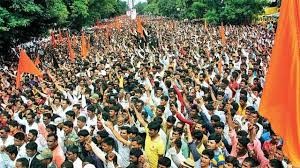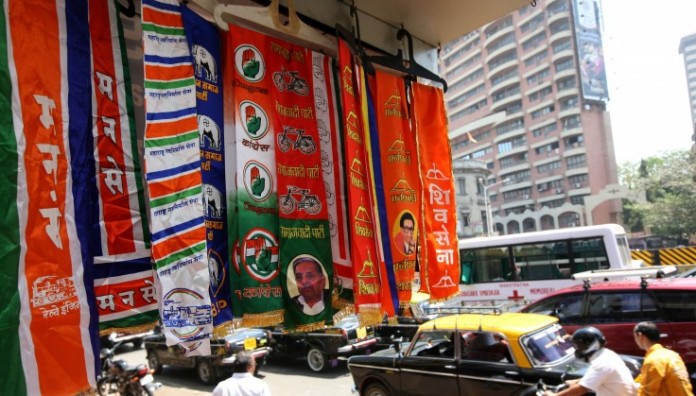In this blog post, Shreya Shikha, a second-year student pursuing B.B.A LLB (Hons.) from Chanakya National Law University, Patna talks about the procedure of establishing a political party in India.
“A political party is a team of men seeking to control the governing apparatus by gaining office in a duly constituted election”.[1]
-American political scientist Antony Downs.
A political party or anything in connection with politics is a common topic of every group of Indians who are sitting together at any place. It is always a debatable topic. Most Indians are very interested in politics. We look at the formation of many parties; we find that their establishments are mainly due to ideological differences that result in a split in a parent party and at the end leads to the formation of a new political party with a new agenda.
In multi-party systems like India, the parties are classified into three types’ i.e., National parties, Regional parties and State parties. The statuses of the parties are granted by the Election Commission of India, and after that, are occasionally reviewed. All the parties whether National, Regional or State party, are registered with Election Commission. Unique election symbols are given by the Election Commission to every registered party
Currently, there are 7 National parties and 56 State parties. The total number of registered and unrecognised parties in India is 1786.[2] There are mainly nine regional parties out of 657 Regional parties. There are 12 other upcoming parties.[3]
The Election Commission mandates certain rules regarding starting a new political party in India. These are;
- Every new party has to have at least 100 members. [There are no hard and fast set rules on how or who to recruit, it’s left up to the party]
- Each member is required to hold an Indian voter ID card.
- Individuals or members joining the party must be 18 years old.
- Each office bearer is required to submit details regarding their, and their spouse and children’s, investments and assets, including cash, jewellery, and the market value of properties owned by them.
- Representatives must issue notices in newspapers announcing their intention to form a new political party [Towards a No Objection Certificate]. The commission allows a 30-day window for the public to raise objections on the formation of any party.
After this, the commission scrutinises different affidavits and documents submitted by the party. Representatives can expect to receive a registration confirmation four to five months after submission of required documents.
The submission includes an application for the registration addressed towards the Secretary, Election Commission of India within 30 days following the date of the formation of the party. Any application made after the said period will be time barred under the provisions of Section 29A (2) (b) of the Representation of the People Act, 1951.
Application Procedure
The application should contain the following mentioned documents. Applicant must indicate against each of the items in a CHECKLIST whether the item has been complied with or not.
- Party Constitution should be drawn on following lines:
- Article I: Name of the Party – This should not contain or hurt any religion or caste.
- Article II: Objectives of the Party – This should be within the purview of the Constitution of India.
- Article III: Membership of the Party – This should be open to all adult Indian citizens.
- Article IV: Organs of the Party (Organizational Structure) – Powers and Functions of each of these organs. (Decision-making power should reflect democratic spirit –no veto power). Along with, the method of appointment (and terms) of members to each of these organs. (Not more than 1/3rd members can be nominated; Tenure should be fixed not exceeding 5 years; Periodic elections within 5 years maximum).
- Article V: Office–bearers of the Party – Powers and functions of each of these office-bearers (Decision making power should reflect democratic spirit –no veto power).Along with, the method of appointment (and terms) of each of these office-bearers (Should be elected; Not more than 1/3rd can be nominated; Fixed tenure not exceeding 5 years for everyone; Periodic elections within 5 years maximum).
- Article VI: Rules of Dispute Resolution & Discipline
- Article VII: Basics of Rules of Conduct of Business – Decision making process; Meetings –quorum, notice and decision making etc. (Details can be annexed separately)

- Article VIII: Party Funds & Accounts – Party funds to be utilized for political activities; Accounts to be maintained on accrual system; To be annually audited by Auditor on the panel of CAG; Audited annual accounts to be submitted to the ECI within 6 months of the end of financial year (Details can be annexed separately).
- Article IX: Party Constitution’s Amendment Procedure
- Article X: Merger, Split and Dissolution Procedure
- Article XI: Mandatory Provision under Section 29A (5) of RP Act, 1951.
A CHECKLIST, with a clear answer against each item therein, may be submitted with the application. The relevant page no. of application, where the details of the particular item in the checklist can be verified, must be indicated.[4] [21-page registration application].
The application should be accompanied by the following documents/information:[5]
- The First thing that needs to be done is to send a demand draft for Rs. 10,000/- (Rupees Ten Thousand Only) in favour of Under Secretary, Election Commission of India, New Delhi. The processing fee is non-refundable in this case.
- Next step one has to do is submit a neatly typed/printed copy of the memorandum/rules and regulations/Constitution of the Party containing a specific provision as required under sub-section (5) of Section 29A of the Representation of the People Act, 1951 in the exact terms, which reads “—————(name of the party) shall bear true faith and allegiance to the Constitution of India as by law established, and to the principles of socialism, secularism and democracy and would uphold the sovereignty, unity and integrity of India”. It must be included in the text of party constitution/rules and regulations/memorandum itself as one of the Articles/clauses.
- After this, the General Secretary/President/Chairman of the Party duly authenticates the copy of the party Constitution on each page and the seal of the signatory should be affixed thereon on the party constitution.
Essentials required in The Constitution/Rules of the Party
This is in continuation of application procedures, few essentials that need to be there in the Constitution/rules of the party are;
- There should be an essential provision that needs to be there in the Constitution/rules and regulations/memorandum of the party regarding organisational elections at different levels and the periodicity of such elections and terms of office of the office-bearers of the party.
- Another thing is the procedure to be adopted by the party in the case of merger/dissolution: it should be specifically provided in the Constitution/rules and regulations/memorandum.
- Certified extracts from the latest electoral rolls in respect of at least 100 members of the party (including all office-bearers/members of decision-making organs like Executive Committee / Executive Council) to show that they are registered electors should also need to be submitted.

- An affidavit duly signed by the President / General Secretary of the party and sworn before a First Class Magistrate/Oath Commissioner)/ Notary Public to the effect that no member of the party is a member of any other political party registered with the Commission should also be given while submitting the whole document.
- Individual affidavits from at least 100 members of the party to the effect that the said member is a registered elector and is not a member of any other political party registered with the Commission duly sworn before a First Class Magistrate/Oath Commissioner)/Notary Public. These affidavits shall be in addition to the furnishing of certified extracts of electoral rolls in respect of the 100 members of the applicant party.
- One also has to disclose about all Bank accounts and Permanent Account Number, if any, in the name of the party.
At last one should submit the completed CHECKLIST with other requisite documents.[6]
The application along with all the required documents mentioned above should reach the Secretary to the Commission within 30 days following the date of formation of the party. Any application made after the said period will be time-barred.
Though it is not necessary for every organisation to get registered by the Election Commission, but, if the organisation or body of individual calls itself a political party or intending to avail it. It has to fulfil certain provisions as of the representation of the people act, 1951, (relating to registration of political parties). It is required for them to get it registered with the election commission of India.
It is good to get registered as incentives one gets is very high. Once the candidates set up by a political party get registered with the Election Commission of India, they will get preference in the matter of allotment of free symbols in elections as compared to independent candidates. Furthermore, registered political parties may get recognition as `State Party’ or National Party’ in due course of time, subject to the fulfillment of the conditions prescribed by the Commission in the Election Symbols (Reservation and Allotment) Order, 1968, as amended from time to time. If a political party is treated as a recognised political party in four or more States, it shall be known as a `National Party’ throughout the whole of India, as long as that political party continues to fulfill the conditions for recognition in four or more States based on the results of any subsequent general election either to the House of the People orhe Legislative Assembly of any State. If a political party is treated as a recognised political party in less than four States, it should be known as a `State Party’ in the State or States in which it is so recognised, but only so long as that political party continues to fulfil thereafter the conditions for recognition on the results of any subsequent general election to the House of the People or, as the case may be, to the Legislative Assembly of the State, in the said State or States.[7]
Note: Recently in April 2016, The Election Commission of India amended its rules, now it will review the national and state political parties status in every 10 years instead of the previous five years.
References:
[1] Anthony Downs, An Economic Theory of Democracy( New York: Harper & Brothers, 1957), 25
[2] http://eci.nic.in/eci_main/ElectoralLaws/OrdersNotifications/year2016/Notification13.12.2016.pdf. Retrieved on 19 December 2016.
[3] http://www.elections.in/political-parties-in-india/. Last Updated on June 22, 2015. Retrieved on 19 December 2016
[4] http://eci.nic.in/eci_main/ElectoralLaws/guidelinesandformat.pdf
[5]http://infoelections.com/infoelection/index.php/indian-politics-53015/about-indian-politics-43710/6227-frequently-asked-questions-faq.html. Retrieved on 19 December 2016
[6] http://eci.nic.in/eci_main/ElectoralLaws/guidelinesandformat.pdf
[7] http://eci.nic.in/eci_main1/RegisterationPoliticalParties.aspx
 Serato DJ Crack 2025Serato DJ PRO Crack
Serato DJ Crack 2025Serato DJ PRO Crack










 Allow notifications
Allow notifications



Good information hi thank you so much
Ek manavi hai apse.. resignal languages Telugu ete me bhi ho ga tho aur achha lagega namaskhar
what should be the wording for the resolution to be submitted
I look This Article Is Very Nice,
kya topic btaya hai apne bas hindi hota to jada aacche se mai smajh pata,
Thanku.
Apne sahi Kaha
[…] A Quick Guide On How To Establish A Political Party In India […]